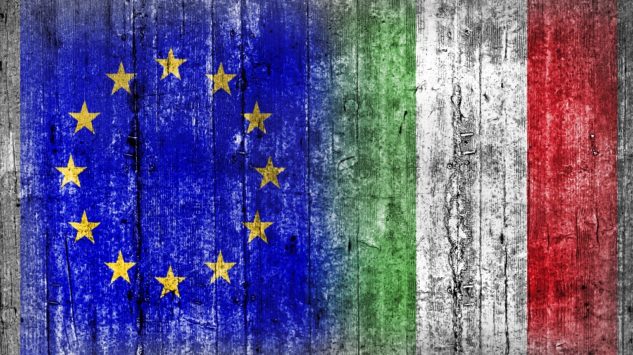Issue Briefs

Italy in political chaos
Paolo von Schirach
May 31, 2018
Italy is once again the problem country within the European Union (EU) and beyond. And this time it may be a really huge problem. After the recent inconclusive political elections, the most improbable governmental coalition between the anti-system 5 Star party and the nationalist/xenophobic League party in the end could not happen on account of Paolo Savona, the openly anti-euro nominee placed by the two would-be coalition partners as Minister in charge of the Economy.
The president says no
Sergio Mattarella, the Italian president, argued that he could not swear in a cabinet in which this critical portfolio would be handed over to an openly anti-Euro economist. This move by the Italian president is border line unconstitutional. The Italian president usually approves the cabinet choices made by the parties that create a coalition government that has a parliamentary majority.
While taking this odd twist into account, without the president’s approval of the proposed cabinet and lacking any new workable coalition, this means that Italy most likely will soon go to new political elections.
A care-taker government
In the meantime, president Mattarella gave the mandate to form a new coalition government to Carlo Cottarelli, a technocrat with IMF experience but zero political experience and backing. Clearly Cottarelli has no political mandate for any long term political solution. Assuming he can stich something together, he will be the head of a care taker cabinet tasked to deal with day to day affairs, as the country prepares to go to new political elections.
This bad scenario: an improbable political path for Italy –an openly anti-European, populist, anti-immigrant coalition, without any credible economic or fiscal agenda—and now nothing except for fresh elections which may not yield better political outcomes is seriously disheartening and potentially very disruptive for both Italy and the European Union. We should remember how just a short while ago the financial/fiscal/political mess in Greece for years kept all of Europe preoccupied.
Another Greece?
At the time, some speculated that the Greek crisis might have caused the collapse of the entire Euro edifice. Well, in the end, with the enormous combined financial back up from EU Headquarters in Brussels, the European Central Bank in Frankfurt, and the IMF in Washington, DC, super indebted and comatose Greece was kept alive –if barely.
Worse than Greece
Well, if the confused Italians really want to pursue the objective of exiting the Euro, this would be a lot worse than the Greek crisis. Unlike tiny Greece, Italy is the third largest economy within the Eurozone. Yet, size notwithstanding, the Italian economy is extremely fragile due to low productivity and lack of innovation on a scale that would produce any real champion that could effectively compete in the global arena.
Besides, the Italian people have to shoulder an astronomic public debt, (the second worst as a percentage of GDP within the Eurozone, after Greece, and third largest in the developed world after Japan), while the country’s economic fundamentals are very weak. Assuming even a small rise in interest rates, debt service alone could become an unmanageable fiscal problem.
Blame game
But the Italians have the bad habit of not taking responsibility for their own mess. They take refuge in convenient conspiratorial theories whereby all their economic and fiscal problems have been caused by others.
The semi-official narrative is that the Germans try to impose their own will on Europe, including unwarranted fiscal discipline, on countries (like Italy) that believe that profligacy and debt are perfectly alright. Besides, many believe that the adoption of the Euro has caused constrains and burdens that the Italians do not like. You see, these days you cannot devalue your currency in the hope of regaining competitiveness for your exports.
The immigration crisis
Last but not least, (and here the Italians do have a valid point) , Italy’s European partners have been looking mostly the other way when Rome repeatedly asked for help in dealing with the gigantic problem –in fact an emergency– of multi-year waves of illegal migration, mostly from Africa, into Italy.
Because of its geography, (Southern Italy and Sicily are fairly close to North Africa), Italy is the first port of call for thousands upon thousands of migrants from Northern and sub-Saharan Africa seeking a better life in Europe. For years they kept coming and there is no end to this migration. Semi-impoverished Italy for a number of years has been dealing all by itself with the massive and seemingly endless problem of welcoming and resettling hundreds of thousands –now several millions– of mostly poor, illiterate and unskilled African and Middle Eastern migrants.
Just imagine the cost of providing shelter, food, medical care and schooling for this helpless and expanding lot. And do not forget the obvious cultural/religious difficulties and consequent frictions caused by the attempt to “assimilate” poor African villagers, many of them Muslim, into the fabric of what is at least nominally a predominantly Catholic society.
Anti-immigrant political parties
In fact, the political rise of the openly anti-immigrant and xenophobic League can be largely ascribed to the emotional reactions of millions of Italians who have seen their country transformed beyond recognition by the impact of millions of African newcomers who cannot possibly blend into the Italian social fabric.
That said, aside from this illegal immigration crisis, it is sadly obvious that most of Italy’s problems are self-inflicted wounds. The real issue is not about having a dispassionate cost-benefit analysis over staying or not staying within the Eurozone.
The real issues
The real issue is a major, supposedly capitalistic, western economy that lost its competitive edge long ago. As The Wall Street Journal, put it (May 28, 2018):
“Lost in the debate is the reality that Italy’s economic problems are mostly homegrown, with a 20-year erosion in productivity, a cumbersome bureaucracy and a dominant small-business sector that has stifled productive investment, making Italy one of Europe’s sickest economies. According to Eurobarometer, 80% of Italians judged the state of their economy as “bad,” with only Croats and Greeks reporting worse opinions.”
So, here is the situation. Confronted with slow but steady economic decline, due to lack of competitiveness, the Italians are incapable or unwilling to do what it takes to take responsibility and change course.
Reforms in order to regain competitiveness
What’s to be done? First of all, Italy should reform and seriously upgrade the entire edifice of public education in order to produce better educated new generations that could successfully compete with their counterparts in Northern Europe and across the world. Then labor markets and civil law procedures should be dramatically reformed in order to give employers and foreign investors the confidence they need in order to bet on the Italian economy. Firing workers is too difficult. Settling business disputes in court may take years.
Last but not least, there is the enormous challenge created by the twin and often intermingled cancers of endemic corruption and organized crime. It is hard to do business in a country in which kickbacks are the norm, while vast sectors of the economy and local politics are controlled by the Mafia, and its siblings: Camorra and ‘Ndrangheta.
Fighting about the Euro and excessive German influence may be politically expedient, but it is just like charging the windmills. It will get Italy nowhere.
That said, I doubt that there is any appetite to see this serious political impasse as an opportunity to change course and start behaving in an adult way, that is: take responsibility and undertake serious reforms. The tendency to look for and find scapegoats abroad, while hoping on simple political fixes for gigantic economic problems, is deeply ingrained.
Stop right at the edge of the abyss
Still, if the past can offer any guidance, the Italians while messy and litigious, usually stop when they get right at the edge of the abyss. Confronted with the real possibility of a complete collapse, generally they retreat and agree to pay a huge economic price in order to steady the economy. However, once the emergency is gone and sheer survival is no longer in question, then the usual game of blame takes over again, with a vengeance.
Italy could choose to undertake serious reforms, this way regaining economic competitiveness and credibility, becoming once again the destination of precious foreign investments.
But I would not count on wisdom and sobriety suddenly springing in this country of myopic leaders perennially fractured by parochial interests.
 |
Paolo von Schirach is President of the Global Policy Institute and Professor of International Affairs and Economics at BAU International University www.bauinternational.com He is also the Editor of the Schirach Report www.schirachreport.com
|
The views and opinions expressed in all issue briefs are those of the authors